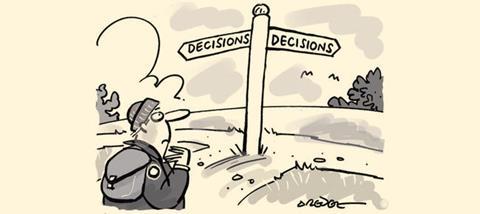
Surely it was a frozen hell.
It was January 1945, the coldest winter in a hundred years. For prisoners held in concentration camps like Auschwitz, and British POWs in stalags, hope jostled with terror. The distant booming of artillery announced that the Russian Army was ever closer, but then the lingering question on everyone’s mind was this: what would the Nazis do with the tens of thousands of prisoners, witnesses to all their appalling crimes?
The solution was fiendishly simple– the evacuated prisoners would be forced to march; some call it the death march. Many would perish of starvation, disease or exhaustion. Those who stumbled during the 20-mile daily trudge were despatched with a rifle butt to the neck. Any who attempted escape were shot. Trench foot and typhus were rife. Some did not change their clothes for three months, their skin teeming with lice. Food was scarce; dehydrated, they sucked on snow. Like walking deadmen, some soiled themselves as they shuffled along. I learned the story of one of them, prisoner 5239. Captured at just 19, he should have been anxious about acne and girlfriends, but five long years behind barbed wire forced him to grow up fast. He had no choice.
Suddenly, without warning, the moment came. It was a five second junction, a crossroads between life and death. As they rounded a bend, he glanced back, and realised that the rear guard was out of sight – and, hurriedly looking ahead, it was the same. For ten paces or so, they could not be seen. He had a choice, and he decided. Turning to a friend, he hissed: “Quick! Run! Now.”
And so run they did, dashing into the woods. Hearts beating fast, waiting for the alarm to go up and shots to be fired, they hugged the frozen ground until at last the column passed. With no idea where they were, they finally found an isolated house. The owner, a woman whose husband was away at the war, feared rape or worse. Reassured, she cooked them a meal, and they slept in the barn. From there, the details fade, but somehow they finally made it home. He met his sweetheart, they married and he tried to settle back into a normal life. Quizzed about those years, he said very little. Perhaps he’d decided not to give his captors any more headspace.
Hearing his story, I wanted to make a response to honour his decisiveness. And so, I have decided...that I will be decisive. On that fateful day in arctic Poland, there was no time for dithering. Everything hung in the balance. And so, I want to be one who chooses well.
Every day is filled with choices, and some of them are pivotal. Decisions don’t call ahead, or come with a health warning. While many are inconsequential, some are monumental thinly disguised doorways to joy or tears.
And so I will be decisive. That doesn’t mean impulsive or reckless. I will be prayerful, take stock, weigh the options and consult trusted counsel. But that young man’s story has nudged me to abandon meandering. I will not squander my freedom with indecision.
Much later in years, that escapee made another epic choice. After decades of ignoring God, angry at the horrors he’d seen and felt, he chose to follow Christ, the great liberator. Shortly after, a stroke silenced his speech, and he became a prisoner once more, trapped inside his own head, unable to speak an intelligible word, no means of escape. At 75, he breathed his last, finally free.
Hearing that story, this much needs to be said: thank you, prisoner 5239, for the inspiration and the legacy, the call to be decisive and brave, to take the risk when the moment comes.
Thank you for surviving, so that your children could exist.
And thanks, most of all, for being my dad.




























